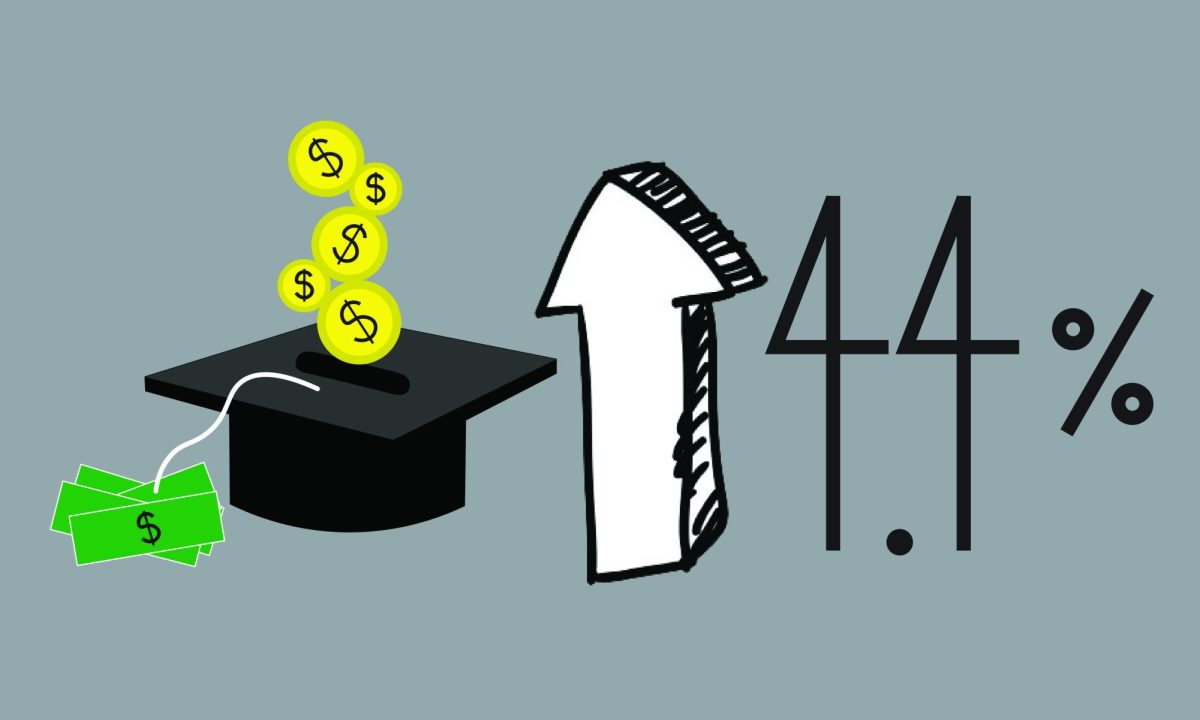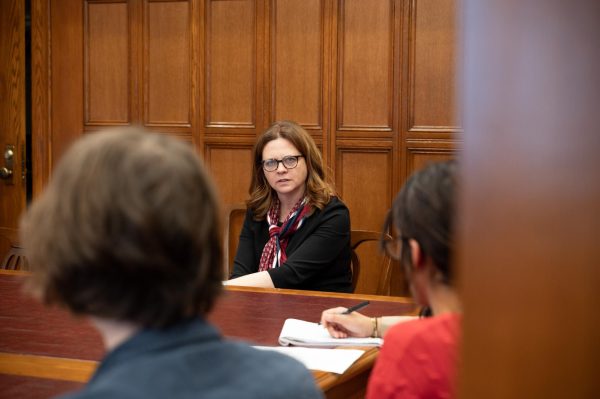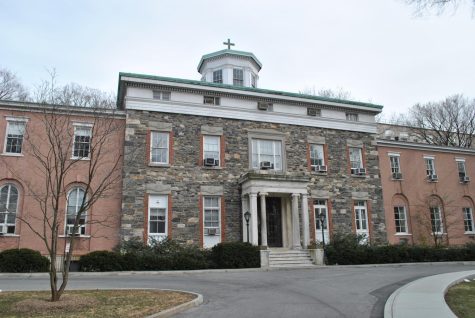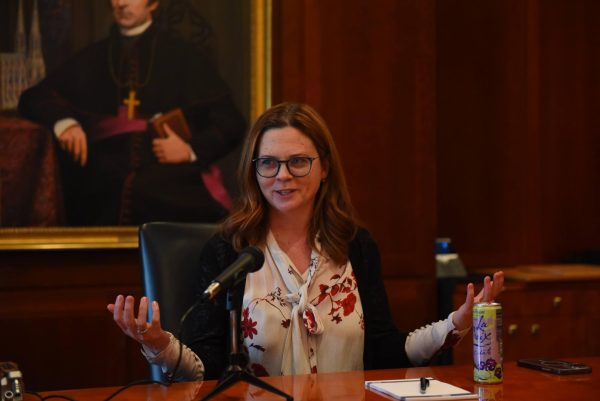In an email sent to Fordham students and their families on March 13, John W. Buckley, vice president for enrollment, announced that the university will be increasing undergraduate tuition, food and housing fees by 4.4% for the upcoming 2024-25 academic year. Buckley cited inflation, increasing demands for compensation, and overall rising costs for insurance, utilities and technology among others as the impetus for this decision.
According to the U.S. Bureau of Labor Statistics (BLS), inflation rates initially declined after hitting a peak ofat 9% in June 2022. However, the BLS notes that over the past year, inflation has remained steady at about 3.5%, which is above the Federal Reserve’s target of 2%. In the New York metropolitan area, inflation was lower than the nation’s average with prices up about 3.1% instead of 3.5% since March 2023.
Certain areas of the economy are still experiencing relatively high inflation rates. BLS found that inflation in the New York metropolitan area’s housing market remains at 5%. Additionally, the prices of fuel and utilities have increased by 10.2% since last year confirming Buckley’s statement regarding the school’s rising costs in this sector.
On March 30, 2023, University President Tania Tetlow announced a 6% tuition increase for the 2023-24 academic year. The price for undergraduate tuition and fees was $61,567 — about $18,090 less than the national average for the 2023-24 academic year according to US News.
In his email, Buckley did not disclose if Fordham will be allocating additional funds to their financial aid budget.
In the 2021-22 academic year, Fordham generated $487,730,000 from tuition fees, about 87% of its total revenue. Tuition was not raised that academic year because of the COVID-19 pandemic. That same year, the university spent $317,296,000 on instruction alone which is about 52% of its total costs. Undergraduate tuition and fees costed $56,161 that academic year.
With the 4.4% increase for the 2024-25 academic year, tuition and fees will cost $62,990 for full-time undergraduate students and room and board will range from $11,900 to $24,285 for Fordham Lincoln Center students.
Justice Ramsay, Fordham College at Lincoln Center (FCLC) ’27, discussed how the decision to increase tuition makes Fordham’s diversity, equity and inclusion efforts seem performative.
“They are so obsessed with their little statistics about admitting people of color and other different backgrounds. But then, they raise the tuition, without any increasing financial aid, which makes it impossible for low-income students to stay at the school,” Ramsay noted.
Bob Howe, associate vice president for communications, commented on the financial aid budget for the upcoming academic year.
“We will do the best we can to help those most affected by the increase. We can’t offer enough financial aid to completely offset the tuition increase,” he explained. “There would be no point in raising tuition if the increase was canceled out by more financial aid.”
“They are so obsessed with their little statistics about admitting people of color and other different backgrounds. But then, they raise the tuition, without any increasing financial aid, which makes it impossible for low-income students to stay at the school.”Justice Ramsay, FCLC ’27
Students have also expressed that this increase will affect their decision to stay at the university because tuition was already unaffordable for them.
Ramsay stated that her experience with the Office of Financial Aid has not helped her come up with adequate alternative options if she cannot pay her tuition.
“I have been appealing my financial aid package since I arrived here,” Ramsay shared. “If you go to them and tell them that you don’t know how you are going to afford tuition this semester, they will tell you to take the semester off.”
“The tuition increases because our costs go up, primarily because of compensation costs which is almost two-thirds of our budget.”Tania Tetlow, university president
Ian Hancer, FCLC ’27, discussed how the uncertainty of not knowing if you will be able to afford next year’s tuition increase is stressful.
“I don’t even know if I will be able to graduate on time, and that’s jeopardizing my future. It is really stressful because nothing is ever guaranteed,” Hancer said. “I might have to transfer out because I can’t afford it.”
For incoming first-years, Fordham provided a reference guide on financing their education. It includes information on tuition financing options, four-year financial planning strategies and an explanation of student loans and financial aid packages.
The plan also notably introduces the Fordham Tuition Stabilization Plan, which allows students to abate future tuition increases by repaying the tuition for future semesters at the current tuition rate.
Increased demands for compensation were a part of Buckley’s explanation for the tuition increase. The Fordham Graduate Student Workers Union is currently preparing for a potential strike since negotiations with the administration over better wages and healthcare benefits have stalled.
On a national level, wages for university employees have increased by 4.1% from January to December 2023. The BLS has not published new data on employment cost indexes since.
While students understand the reasons behind Fordham professors advocating for higher wages, they are uncertain about the connection between this and the need for a tuition increase.
“I don’t even know if I will be able to graduate on time, and that’s jeopardizing my future. It is really stressful because nothing is ever guaranteed. I might have to transfer out because I can’t afford it.”Ian Hancer, FCLC ’27
Hancer spoke about how tuition has been increasing but issues such as the standard of facilities and dorm life have not improved.
“The standard of living in the dorms is awful. A lot of things are falling about or moldy. Where is the money going?” he said. “I think the tuition wouldn’t have to be raised if they were more organized.”
University President Tania Tetlow explained why tuition must increase year-to-year, during a press conference with student press held on Feb. 27.
“The tuition increases because our costs go up, primarily because of compensation costs which is almost two-thirds of our budget,” she expressed.
Howe added that regular improvements are built into the budget, and cited the McShane Student Center and the overhaul of the Rose Hill dining services as two examples of this.
“A great deal of the physical work on all of the campuses is not obvious to people—rust never sleeps, and it takes constant labor and funding to repair and maintain campus infrastructure.” Howe noted. “Like everything else, the cost of that work goes up every year with inflation.”
A change.org petition, which has acquired 44 signatures as of April 16, expressed similar sentiments over the lack of transparency over tuition allocations. The petition, which was authored by “concerned Fordham student” used quotes from Tetlow’s email to the Fordham community about last year’s tuition increase.
“Though the Fordham administration claims that they ‘are working hard to control those costs’ and that it ‘will continue our efforts to bring down those costs as much as we can,’ the university’s tax filings show hundreds of millions of dollars flowing elsewhere,” the petitioner’s statement said.
The petition subsequently listed expenditures in the university’s more recent tax filings. These were acquired from the nonprofit explorer section of the website ProPublica, a non-profit newsroom that specializes in investigative journalism. The list included the amount spent on the expansion of the Joseph M. McShane, S.J. Campus Center, and the salaries and bonuses of athletic coaches, among others.
“The entirety of money put towards financial aid was slightly less than $300 million. However, nearly $306 million was spent on investments in the Caribbean and Central America,” the list concluded.
Howe clarified that this listing is not funds spent, but rather the value of Fordham’s endowment that is invested abroad.
At the end of the petition there are four demands calling for overall greater administrative transparency through a town hall and the release of university tax returns. Furthermore, the demands included an explanation of university expenditures and how it improved the education or quality of life of the Fordham community. Lastly, it insisted on a feasible plan for reducing tuition for the future.


















